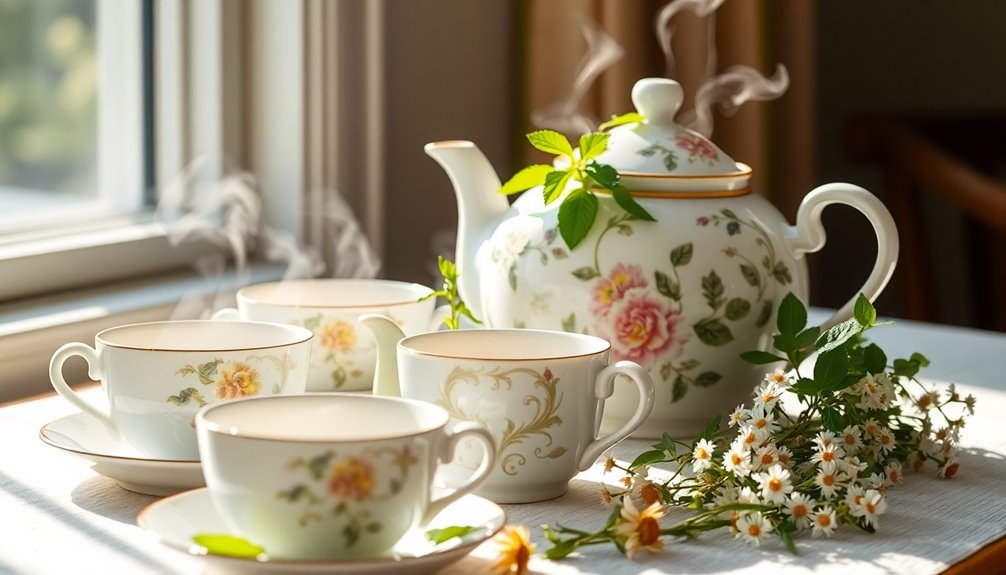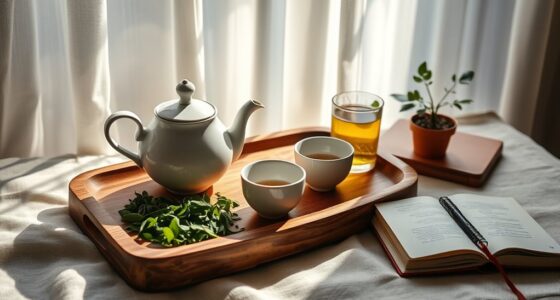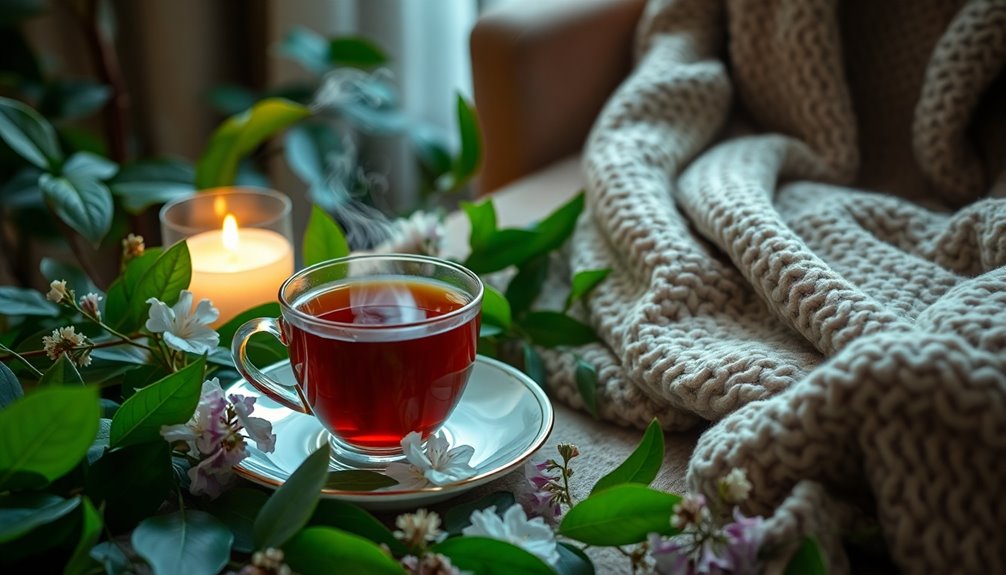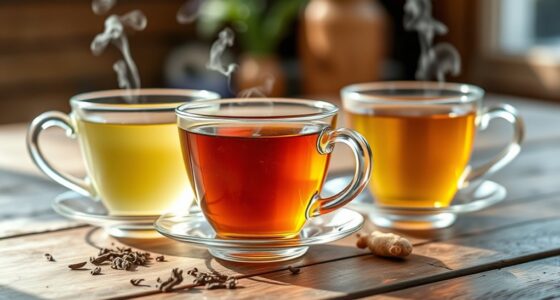Chill out with some soothing herbal teas that are perfect for a cozy moment! You can try chamomile, which helps you relax and sleep better, or lemon balm, which calms your nerves. Lavender is another lovely option that creates a peaceful atmosphere. Just steep your favorite herbs in hot water for about 5-15 minutes. You can mix different herbs like chamomile and lavender for extra flavor or add a bit of honey for sweetness. Sipping on these delightful teas can bring comfort to your day, so stick around to discover more tasty recipes and tips!
Key Takeaways
- Combine chamomile and lavender for a calming blend that promotes relaxation and improves sleep quality.
- Mix lemon balm and peppermint to create a soothing tea that aids digestion while calming the nerves.
- Try valerian root tea for enhanced sleep quality and reduced grogginess in the morning.
- Create a seasonal herbal blend by mixing ginger and chamomile for a warming, comforting experience.
- Experiment with honey and lemon additions to enhance flavor and provide extra soothing effects in your tea.
Introduction
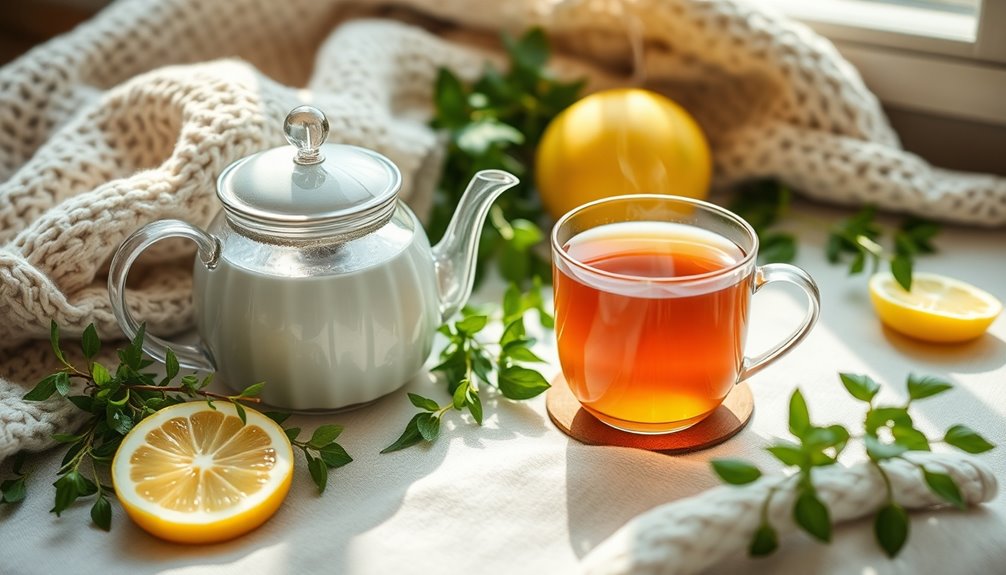
When life gets hectic, turning to soothing herbal teas can be a simple yet effective way to unwind and restore your calm. You might be surprised to learn that herbal teas, like chamomile, lavender, and lemon balm, are famous for their calming properties. Chamomile tea is especially noted for its ability to promote relaxation and reduce stress, often enhanced by the ideal steeping time of 5 to 15 minutes. Additionally, herbal teas like chamomile can offer anti-inflammatory properties that further contribute to relaxation.
These delightful drinks can help you feel relaxed and reduce stress. Plus, they're caffeine-free, so you can enjoy them at any time of day, especially in the evening to help you sleep better.
Making your own soothing tea recipes is easy. You just steep high-quality, organic herbs in hot water for 5 to 15 minutes, allowing those beneficial compounds to work their magic. Herbal teas may also aid in digestion, making them a great addition to your wellness routine.
As you sip your tea, it's a perfect moment for mindfulness, giving you a chance to focus on yourself and your well-being. Herbal teas also offer hydration, antioxidants, and digestive benefits, making them a healthy choice for your daily routine. The use of herbal teas like chamomile and ginger can also alleviate menstrual discomfort and promote relaxation.
Herbs for Relaxation and Calm

Choosing the right herbs can make all the difference in crafting a soothing tea that promotes relaxation and calm. When you think of herbal teas, chamomile tea often comes to mind first. It's famous for its relaxing effects, making it perfect for winding down after a busy day. Just imagine sipping a warm cup of chamomile while the delicate flowers work to soothe your stressed nervous system!
Another wonderful herb is lemon balm. This cheerful plant not only calms your nerves but also helps with tummy troubles. It's like a gentle hug for your stomach!
Plus, there's lavender. Its lovely scent is known for promoting sleep and helping you feel peaceful. A little lavender in your tea can turn a simple moment into a calming ritual.
You can enjoy these herbal ingredients hot or cold, turning each sip into a delightful moment of mindfulness. By using high-quality, organic herbs, you not only boost the flavor but also enjoy their calming properties. Additionally, incorporating traditional tea ceremonies into your tea-drinking experience can enhance the overall relaxation effect.
Herbs Promote Relaxation and Calm
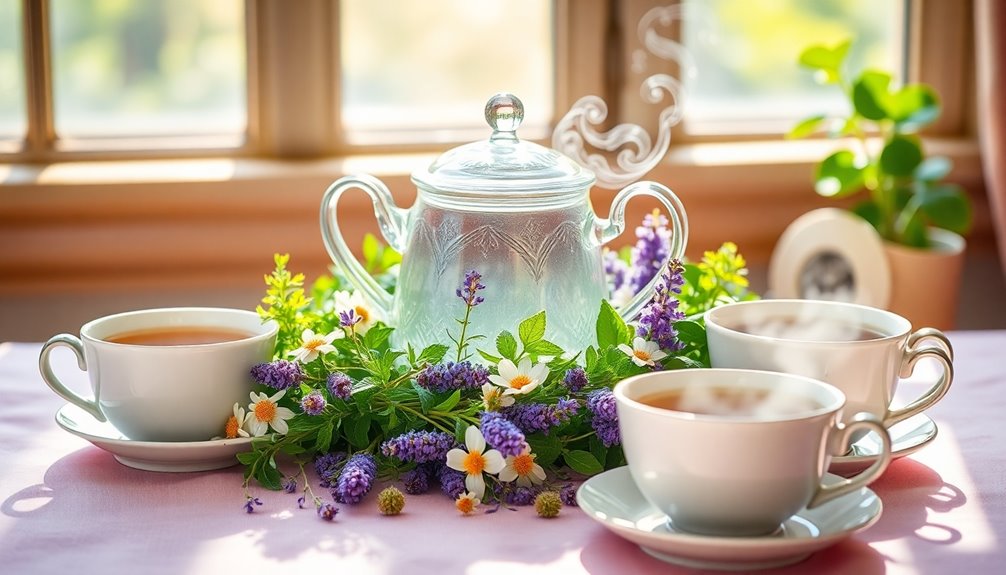
A variety of herbs can significantly promote relaxation and calm, making them essential for anyone seeking relief from daily stress. Imagine sipping a warm cup of herbal tea, filled with the calming effects of chamomile and lavender. These wonderful herbs are known for soothing your stressed nervous system and helping you unwind after a long day. Additionally, herbal teas can help enhance overall well-being and comfort, making them an invaluable part of your relaxation routine. Regularly consuming soothing herbal teas can also support your skin protection routine by promoting hydration.
Lemon balm, often called the Fountain of Youth Herb, is another fantastic choice for your herbal tea recipes. It can ease nervous tension and upset stomachs, making it a perfect addition to your self-care ritual. Additionally, incorporating essential oils into your relaxation routine can enhance the calming effects of your tea.
Plus, since herbal teas are caffeine-free, you can enjoy them any time of day without worrying about staying up too late.
Drinking these soothing alternatives isn't just about taste; it's a moment to relax and recharge. Picture yourself in a cozy spot, surrounded by comfort, as you take a slow sip of your herbal tea.
This simple act can boost your mental well-being and help you embrace the calm you deserve. So, gather your favorite herbs, brew a cup, and let the soothing flavors work their magic!
Herbs for Sleep Enhancement
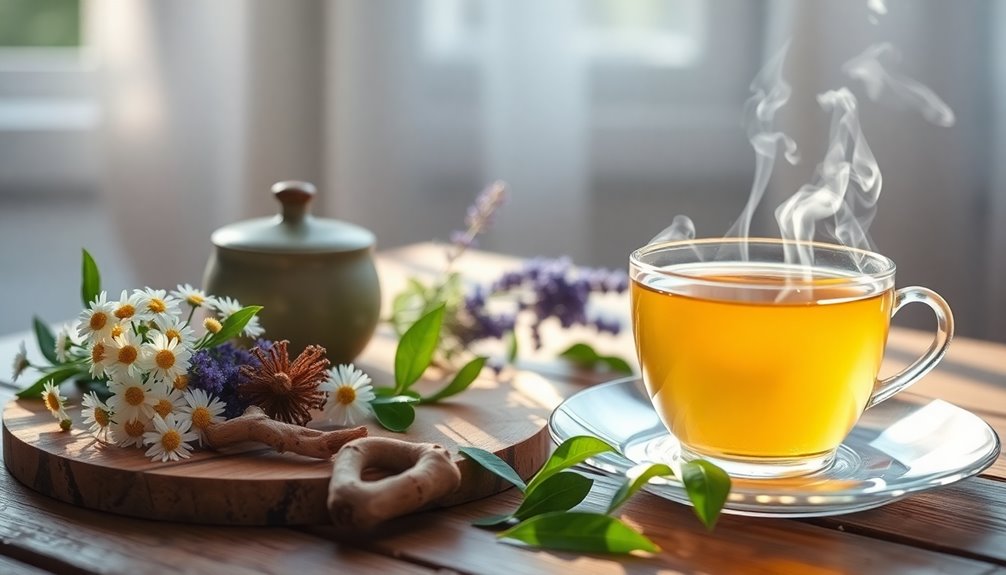
If you're struggling to get a good night's sleep, incorporating certain herbs into your bedtime routine can make a significant difference. One of the best herbal tea recipes for sleep enhancement includes chamomile, known for its lovely taste and calming effects. It contains apigenin, which helps you feel sleepy and reduces insomnia. Additionally, lavender oil is renowned for its calming effects, which can further enhance your pre-sleep routine. Research shows that herbal remedies can help improve sleep quality and duration. Furthermore, regular use of calming herbs like chamomile can also promote skin hydration and radiance.
Another fantastic herb is lemon balm. This herb has been used for ages to help people sleep better. It's believed to boost GABA levels in your brain, making you feel relaxed and ready for bed.
You might also want to try valerian root. When combined with chamomile and passionflower, it can help you fall asleep faster and improve your sleep quality without leaving you groggy in the morning.
Passionflower is special too! It has flavonoids that can help calm your mind and promote restful sleep. Additionally, sipping on herbal teas infused with these calming herbs can enhance your overall aromatherapy experience, creating a soothing pre-sleep ritual that prepares your mind and body for rest.
Herbal Interactions With Medications
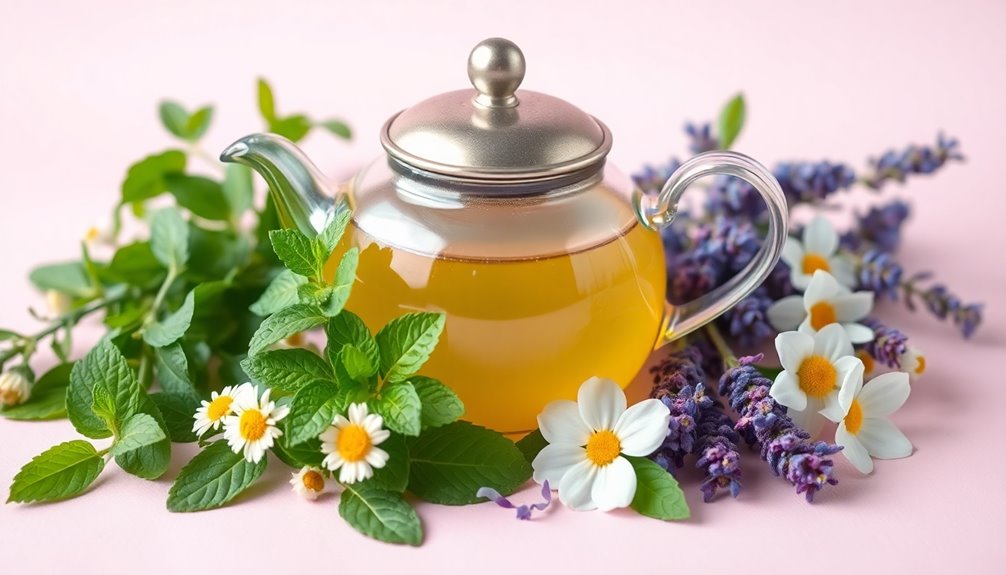
Herbal teas can offer soothing benefits, but they can also interact with medications you might be taking. For example, chamomile is a lovely health tonic, but it can increase bleeding risks if you're on blood thinners like warfarin. Additionally, AI-driven analytics can help track potential interactions by analyzing herbal and pharmaceutical effects.
Peppermint is refreshing, but it mightn't work well with certain acid reflux medications, making them less effective. St. John's Wort isn't usually found in tea blends, yet it can reduce the effectiveness of antidepressants and birth control pills.
If you enjoy lavender tea for its calming effects, be careful! It could enhance the drowsiness of sedative medications, like benzodiazepines. That's why it's super important to consult a healthcare provider before sipping on herbal teas, especially if you're taking prescription medications. Moreover, understanding how herbs can affect your health is crucial for optimal well-being, as it allows for better-informed decisions about your tea choices.
Furthermore, individuals with Borderline Personality Disorder may experience heightened emotional responses, which could be influenced by herbal tea consumption. By being cautious, you can enjoy the soothing flavors and benefits of herbal teas without the worry of any tricky interactions.
Practical Applications
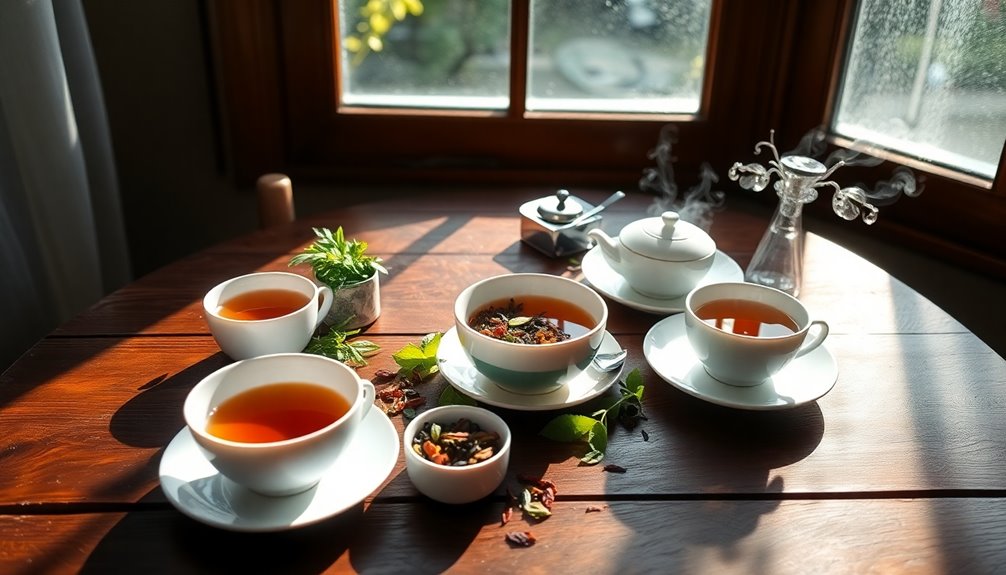
Understanding how herbal teas can interact with medications is the first step toward safely enjoying their benefits. When you prepare a soothing herbal tea, like a blend of chamomile, lavender, and lemon balm, you're not just making a drink; you're creating a moment of relaxation. Drinking herbal tea can also be a beneficial practice for your dental health, as certain ingredients can help reduce inflammation in the mouth. Moreover, certain teas like chamomile are known for their soothing properties that can enhance your overall well-being.
Steep these calming herbs for 5-15 minutes to unlock their wonderful flavors and health benefits. Using high-quality, organic herbs is essential. They enhance your tea's taste and support your journey toward stress relief and mindful self-care.
Drinking herbal tea can turn into a delightful ritual that helps you pause during a busy day, promoting your mental well-being. Feel free to experiment! You can mix lavender with chamomile or add a hint of spiced pear for a tasty twist. This way, you personalize your tea based on what you like and what you need, whether it's better sleep or a happy tummy. Regularly sipping on these herbal blends can be a fantastic addition to your wellness routine, helping you relax and enjoy life a little more. Additionally, certain herbal ingredients like chamomile may also offer health benefits for digestive issues, making them a versatile choice for your tea recipes.
Frequently Asked Questions
What Tea Calms Nerves and Anxiety?
If you're looking to calm your nerves and anxiety, try chamomile or lavender tea. Lemon balm and peppermint also help soothe your nervous system. Regularly sipping these can significantly enhance your overall well-being and relaxation.
What Is the Most Relaxing Tea in the World?
When you're looking for the most relaxing tea, chamomile and lavender are top choices. They both help calm your mind, reduce anxiety, and promote better sleep, making them perfect for unwinding after a long day.
How Do You Make Soothing Tea in DST?
To make soothing tea during DST, choose calming herbs like chamomile or lavender. Combine them with boiling water in a mason jar, steep for 5-15 minutes, and enjoy your relaxing beverage in the evening.
Do Calming Teas Really Work?
Calming teas really do work! They can reduce anxiety and promote relaxation. Ingredients like chamomile and lemon balm enhance mood and alleviate stress, making these herbal options effective choices for improving your overall well-being.
Conclusion
Now that you know about these wonderful tea recipes, it's time to brew a cup and relax! Whether you're using calming herbs or finding the perfect blend for a good night's sleep, you're sure to find your favorite. Remember, sipping tea can be a delightful way to unwind after a busy day. So grab your favorite mug, enjoy the warm flavors, and let your worries melt away. Happy sipping!

